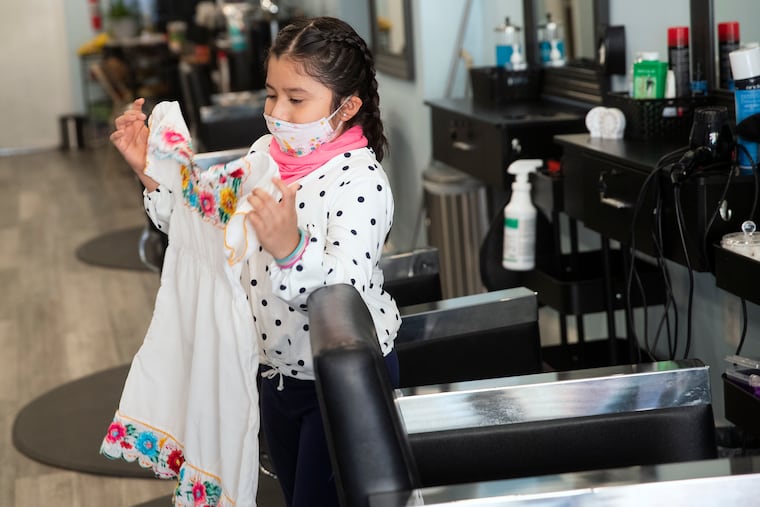In Philadelphia, Our Lady of Guadalupe won’t be celebrated by crowds this year
The Feast of Our Lady of Guadalupe is the most popular religious celebration for Mexicans around the world. Due to the COVID-19 pandemic, the centuries old tradition has been disrupted.

After two decades of large celebrations in Philadelphia by the local Mexican community, the faithful won’t be able to honor the Virgin of Guadalupe with massive gatherings this year. There will be no processions from nine city churches, no mariachis or potluck meals at the Cathedral Basilica of SS. Peter and Paul Friday night.
Regulations to stem the spread of COVID-19 have changed the traditional Philly setting for the festivities, when at least 2,000 parishioners would gather at the Cathedral for Mass the night before the official Virgin’s Day on Dec. 12.
The Feast of Our Lady of Guadalupe is the most popular religious celebration for Mexicans around the world. In Mexico, devotees of the Virgin traditionally sing Las Mañanitas close to midnight on Dec. 11 in a procession to the Guadalupe Basilica in Mexico City. On Dec. 12, millions visit the Virgin’s temple, to make offerings, pay tribute, and request spiritual guidance.
This year, because of the pandemic, there will be no celebration or tribute to the Virgin at the Basilica of Guadalupe, as religious activities have been canceled for the first time since 1927, when the Catholic Church decided to close it to protest proposed laws limiting religious practices in Mexico. The symbolic celebration has been held for 489 years.
Monsignor Salvador Martínez, rector of the Guadalupano sanctuary in Mexico, has invited parishioners to celebrate the Virgin at their local churches, if possible, or in their homes through radio, televised events, or other digital platforms.
In Philly, the celebration has been altered by the current guidelines and restrictions affecting houses of worship, but it hasn’t been canceled. The Archdiocese of Philadelphia is hosting the annual Mass at the Cathedral at 9 p.m. Friday for those who have already registered to attend in-person while complying with safety regulations. Attendance has been limited to 20 people per parish. The liturgy is being streamed live online.
“The methods being employed to observe the Feast of Our Lady of Guadalupe this year are consistent with the Archdiocesan approach to liturgical celebrations since the onset of the pandemic,” Kenneth Gavin, spokesperson for the Archdiocese, said in an email statement. He acknowledged the celebration as one of great importance for the Hispanic Catholic community in the region.
Parishes across the city will celebrate with individual Masses on Saturday, the Day of the Virgin, with limited in-person capacities.
For the last 10 years, Leticia de la Cruz, 38, made it a family tradition to dress up, along with her two children, in colorful quexquémitl, embroidered Indigenous ponchos her mother made each year from wool and sent from Mexico. The three would then join the nearly two-mile procession from Saint Thomas Aquinas Church in South Philadelphia to the Cathedral. She said it was her way to educate her American children about their Mexican heritage.
“I was trying the show them the importance of tradition, cultural inheritance, and the value of faith. But one thing is what we want to do and another thing is what we can do,” De la Cruz said of the new reality brought by the pandemic.
This year, De la Cruz doesn’t plan to attend any of the Masses and hasn’t made any plans to privately celebrate the Virgin of Guadalupe. Her husband is still recovering from health complications caused by COVID-19. She said the pandemic has taught her to live day-by-day, instead of making long-term plans. She remains hopeful the Mexican community will celebrate its traditions again, someday.
David Meneses, 40, owns Cafetería y Panadería Las Rosas. He is one of 10 business owners who each year prepare food for the parishioners at the Cathedral potluck, as their own offerings to Lupita. Since he opened the bakery on South 8th and Watkins Streets in 2011, Meneses has participated at the community-organized event, baking bread, champurrado and churros and offering coffee. He found this was the best way for him to continue the traditions he celebrated in Mexico.
“Before, we would walk or ride a bike in the procession to the Basilica, as an act of worship. But in this country, since we have a business, we put our heart into what we do and we give back to the Virgin for what she has given us these years,” he said of his previous work in Philadelphia.
Meneses said he was disappointed when he learned the Philadelphia activities were canceled. He said he will pray, along with his wife and tow children, at home.
For the past 20 years, Antonio Tepayolt, 51, has organized parishioners at Saint Thomas Aquinas Church on Morris and South 17th Streets for Our Lady of Guadalupe celebrations. He said this is the first year his church has faced such challenges putting together the festivities.
Even though there is no procession, he and other organizers must make sure all attendees — whether at the Cathedral or local church — have masks to wear at the Mass and that parishioners’ temperatures are checked at the entrance. Those registered for the Dec. 11 Mass have been asked to have dinner before they leave for the Cathedral and abide by the limited-capacity regulations.
Tepayolt was grateful that the Archdiocese granted permission to celebrate, even if it will be in a modest setting.
“Those are things that are unpredictable,” he said. “We can’t ask why, but celebrate with limitations.”